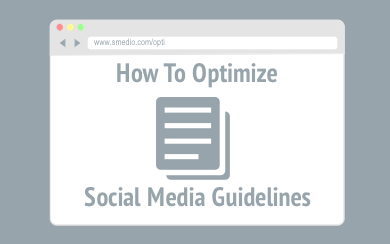How do you best optimize your social media guidelines? Ever get involved in a discussion where, at the very beginning, you’re sure you have a great understanding of the topic, but by the end you doubt your knowledge of the subject? Those conversations aren’t very much fun. If you ever find yourself in a discussion on how corporations should set guidelines for social media use, expect it to happen.
Perhaps I had never really given it that much thought before, but halfway into a discussion about social media guidelines in the business world, I realized the many layers that need to be considered before setting them in stone.
During the discussion, the obvious guidelines without much gray area were mentioned, and I’ll get into those in a bit. But there were some real meaty issues that came up that required a whole lot of thought. In the end, we were left with more questions than answers.
The main issue with setting corporate guidelines for social media is this one question: How much is too much? It’s a question that needs to be considered at every step of the way. As companies are starting to stampede their way into social media venues, there’s a lot of apprehension that needs to be overcome. The apprehension stems from a couple of things:
– Social media is all about transparency. In fact, it relies on it. Some companies aren’t thrilled by this idea.
– There is absolutely no way to control the message. Companies can get involved and participate in the conversation, but they have no power over where it goes, and that’s a scary concept.
– There’s an awful lot to worry about when you could have hundreds of employees with a whole lot of freedom to do and say what they want about the company.
The logical way to combat that apprehension from the corporate perspective is to create a whole mess of rules. Rules mean consequences, and consequences mean control — something there’s not a whole lot of in social media. It’s understandable why companies would want to have a rather extensive list of do’s and don’ts before jumping into the social media world.
But knowing where to draw the line is important. Consider these obvious social media guidelines:
– Do not give away restricted or privileged information.
– Don’t give the impression that you’re speaking for the company.
– Never ignore customer comments.
– Social media use during business hours should pertain to business.
These rules seem pretty reasonable. Any good business looking to optimize its social media experience would likely set these guidelines for its employees. Now, consider these ones:
– Do not use profanity in any form.
– Don’t post inappropriate photos on your profile.
– Don’t talk in a negative way about the company, your co-workers or your supervisor.
These all seem like guidelines you’d find on your company’s social media policy. In fact, some of them might be there. Do they seem reasonable? As personal guidelines, they’re probably pretty solid. But as corporate guidelines, they cross into that gray area I mentioned earlier.
While it’s probably a good idea to not use profanity or to refrain from speaking negatively about your company on Facebook or Twitter, can a company really mandate such rules without infringing on an individual’s rights? It’s a question that can spark a lot of opinions, but probably not one clear, definitive answer.
As social media becomes more and more a part of our business lives, we have to face the reality that there are no real precedents set for how companies properly set usage guidelines for their employees. We’re all kind of making it up as we go along. But it’s important, as we do this, to ask the right questions — no matter how tedious the process then becomes — in order to do what’s best for not only the company but for the individual employee, as well.
What do you think? Are there corporate social media guidelines out there that you don’t agree with? What types of guidelines do you think go too far?
[et_social_share]







